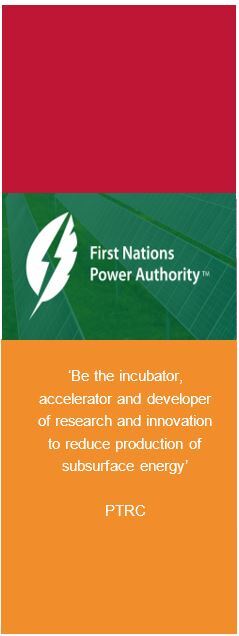The 6th Annual FNPA Forum of Indigenous leaders and industry corporate decision-makers was successful in achieving realistic goals of ‘ESG (Environmental, Social and Governance) strategies’ for reducing carbon emissions and strengthening ‘Indigenous inclusion’ in the different aspects of the power industry. The reinforced statement at the Forum of ‘Pathway to Powerful Opportunities’ included the challenges of reducing emissions and fossil fuels, while simultaneously increasing opportunities of advancements and relationships with Indigenous peoples across the industry.
CAPACITY AND RELATIONS BUILDING
BUILDING
As an attendee and a part of the audience of the forum, I was honored to hear from world-class Indigenous leaders and industrial captains within the GHG emissions reductions industry, CCUS (Carbon Capture Utilization and Storage), and other innovative energy sources. Simultaneously, the conference honoured ‘Indigenous inclusion’ with all energy sectors, strategies, and opportunities of economic advancement.
The conference exhibited leaders in research and innovation within sustainable energy sectors. Ran Narayanasamy, CEO of PTRC, was part of a panel called "Pursuing Net-Zero Through Various Cleaner Energy Technologies", and he discussed PTRC projects such as the Aquistore CO2 Storage MMV program, the Heavy Oil Research Network (HORNET), CCUS and other emissions reduction processes. PTRC recently became a sponsor of the Canadian Council for Aborginal Business, and committed to the Progressive Aborginal Relations program to increase Indigenous diversity and inclusion within the energy sector.
Like any avenues within the energy sector, reduction of emissions and greenhouse gases are always challenging. Hosting industrial professionals, clean energy leaders and Indigenous leaders, creates alternative energy solutions and inclusion of all parties involved. This creates a ‘Pathway to Powerful Opportunities’ for youth, Indigenous people, industry, and clean energy.
As an attendee and a part of the audience of the forum, I was honored to hear from world-class Indigenous leaders and Industrial trojans within GHG emissions reductions research and development. This included CCUS (Carbon Capture Utilization and Storage), and other innovative emissions programs like geothermal energy, wind, and solar.
Most importantly, the forum also simultaneously honoured ‘Indigenous inclusion’ within all energy sectors, including strategies, and opportunities for economic advancement.
About Ryan
 My name is Ryan Albert, I am a Cree from the Sweetgrass First Nation, and in my final year of Indigenous Studies at the First Nations University of Canada. I am married and a father to three children. My mother, in-laws, grandparents and uncles were all direct survivors of the Day School/Indian Residential School system and moved on to become educators. Growing up, I was raised by two strong Indigenous women who focused on teaching me my Cree language, cultural identity, and spirituality.
My name is Ryan Albert, I am a Cree from the Sweetgrass First Nation, and in my final year of Indigenous Studies at the First Nations University of Canada. I am married and a father to three children. My mother, in-laws, grandparents and uncles were all direct survivors of the Day School/Indian Residential School system and moved on to become educators. Growing up, I was raised by two strong Indigenous women who focused on teaching me my Cree language, cultural identity, and spirituality.
I left my community to pursue opportunities within education and employment. Prior placement was with F.S.I.N. (Federation of Sovereign Indigenous Nations) working with the STEM (Science, Technology, Engineering and Math) team in developing awareness of opportunities within these fields for Indigenous recruitments throughout Saskatchewan. My summer placement with PTRC (Petroleum Technology Research Centre) will give me the opportunity to explore and research alternative energy solutions within Saskatchewan, and in addition, to be able to network with other innovative companies and sectors that provide expertise in energy solutions of zero to minimal environmental footprint.
After completion of my Bachelor of Arts, I plan to come back into my community to share my knowledge with modern Indigenous practices that come with the academic, in combination with my community roots (culture, tradition and knowledge keeper). I will be utilizing my education degree as a tool to become an Indigenous mentor in providing future opportunities of advances for Indigenous people.

